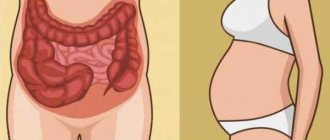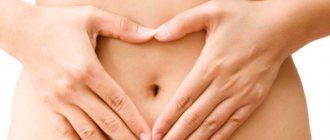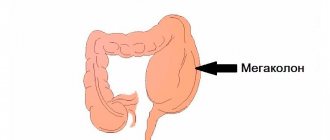What it is
Constipation is a condition of the body in which bowel movements occur very rarely and with difficulty or do not occur at all. Most often, people are embarrassed to consult a doctor with this problem, but if it is neglected, it can lead to unpleasant consequences.
Constipation can be called a condition when the act of defecation does not occur according to the norm of a particular person.
Types of constipation:
- Nutritional . Caused by nutritional disorders.
- Neurogenic . Occurs when the urge to bowel movement is ignored for a long time.
- Hypodynamic . Associated with low physical activity.
- Proctogenic . This type is caused by various diseases of the rectum.
- Toxic . Occurs when the body is poisoned with toxic substances.
- Endocrine . Occurs with hormonal imbalances.
- The medicinal type is associated with taking certain medications.
Constipation can also manifest itself in acute or chronic form. The types of illness, as well as treatment, depend on the causes of constipation.
The process of development of pathology, depending on the cause
There are many causes of constipation in adults
Changes in the motor activity of the muscular tissue of the organ walls can develop due to the influence of the following reasons:
- Autonomic dysfunction. Characterizes disturbances in the functioning of the department of the nervous conduction system, which is functionally responsible for the activity of internal organs. It is observed as a result of psycho-emotional fatigue or a reflex effect on various parts of the intestine from organs located higher in the digestive tract system.
- Endocrine pathologies. Due to changes in hormonal ratios, which is a hallmark of diseases that tend to be protracted, they cause a weakening of the muscle tone of the intestinal walls.
- Vascular changes. Disruption of the blood flow network feeding the walls of the organ has a direct impact on intestinal motility.
- General physical inactivity. Passive vital activity leads to a weakening of the overall tone of muscle tissue, including the intestinal walls and contributing to the appearance of chronic atony of the organ. This phenomenon is facilitated by daily restriction of physical activity during the working day, constant use of vehicles for transportation, passive rest, and old age.
- Inflammatory processes. Localized within the organ, they provoke a violation of its transport function, characterizing the state of constipation.
Read: Toilet suffering or a cure for constipation
Changes in the usual rhythm of defecation are also facilitated by unforeseen situations, such as a violation of the standard lifestyle, which may be associated with a business trip or temporary relocation, late rise in the morning and subsequent rush, a shift work schedule, etc.
Causes
Constipation can occur for the following reasons:
- Poor nutrition . Most people suffer from this because their diet is low in fiber, which stimulates bowel function. Constipation occurs if a person gives preference to high-calorie protein foods, as well as various sweets and baked goods.
- Lack of fluid . Very often a person drinks less water than needed or replaces it with other drinks, such as coffee, tea, and sweet juices.
- Physical inactivity . This reason is common among those people who lead a sedentary lifestyle and do not engage in physical activity.
- Postponement of bowel movements . A person may not respond to the urge for various reasons, but if such behavior becomes frequent and constant, this will lead to a decrease in the urge and, as a result, constipation.
- Taking medications . Some medications negatively affect intestinal motility and can disrupt its functioning. This side effect is usually indicated in the instructions for use of the drug.
- Pregnancy . At this time, constipation can be caused by hormonal changes in the body, and is also associated with pressure from the uterus on the intestinal area.
- Psycho-emotional disorder caused by prolonged stress, life changes, and depression.
These reasons can cause constipation in apparently healthy people. Constipation can also occur due to surgery, abnormal development of internal organs, or various diseases.
Types and causes of constipation
The causes of constipation can be divided into congenital, primary and secondary. The most common type is primary, which is not life-threatening. It is also divided into the affected age group such as children and adults.
Primary or functional – defined by persistent symptoms for more than six months not due to an underlying cause, such as medication side effects.
This is the most common type of constipation and is often multifactorial. In adults, such primary causes include dietary choices: insufficient fiber intake or fluid intake, or behavioral causes: decreased physical activity. In older adults, common causes include insufficient dietary fiber intake, fluid intake, decreased physical activity, medication side effects, hypothyroidism, and obstructive colorectal cancer.
Secondary causes include side effects of medications such as opiates, endocrine and metabolic disorders (hypothyroidism and obstacles: colorectal cancer). Celiac disease and noncellular gluten sensitivity may also be present with constipation. Cystocele often develops as a result of chronic constipation.
There are acute (from several days to several weeks) or chronic (from several months to a year) constipation. This, in the context of accompanying symptoms, helps doctors discover the cause of constipation. People often describe their problems as noticeable bowel movements, hard stools with a lumpy or hard consistency, and excessive straining during bowel movements. Chronic constipation (symptoms on at least three days a month for more than three months) associated with abdominal discomfort is often diagnosed as irritable bowel syndrome.
Poor diet, previous abdominal surgery and certain medical conditions may contribute to this problem. Conditions associated with constipation include hypothyroidism, certain types of cancer, and irritable bowel syndrome. Low fiber intake, insufficient fluid intake, poor ambulation, immobility, or medications can cause constipation. Once the presence of the disease is identified based on the symptoms described above, the cause of the specific and unpleasant phenomenon should be found out.
Other warning signs and symptoms include a family or personal history of inflammatory bowel disease, age over 50, changes in stool consistency, nausea, vomiting, and neurological symptoms such as weakness, numbness, and difficulty urinating.
Constipation occurs when too much water is absorbed. This can happen if the muscles in the colon contract slowly or poorly, causing stool to move too slowly and lose more water.
More detailed reasons:
- Lack of fiber in the diet: People whose diets include large amounts of fiber are significantly less likely to suffer from constipation. It's important to consume fiber-rich foods such as fruits, vegetables and whole grains (fiber promotes bowel movement and prevents constipation) and cut back on low-fiber, high-fat foods such as cheese, meat and eggs.
- Physical inactivity: Constipation can occur when a person becomes physically inactive. This is especially common in older people, and those who have been bedridden for long periods of days or weeks. The risk of its occurrence increases significantly. Experts can't figure out why. Some believe that physical activity leads to a high metabolism, which speeds up processes in the body. Old people tend to have a more sedentary lifestyle compared to younger people and are therefore at high risk of constipation.
- Medicines: The most common medications that cause constipation are: narcotics (opioids), including codeine (Tylenol); antidepressants, including amitriptyline (Elavil) and imipramine (Tofranil); anticonvulsants, including phenytoin and carbamazepine (Tegretol); blocker medications including diltiazem (Cardizem) and nifedipine (Procardia); aluminum-containing antacids, including Amphojel and Basaljel; diuretics, including chlorothiazide.
- Milk: Drinking milk can also trigger this problem. Some people feel constipated when they consume milk and dairy products in large quantities. It is worth consulting with a doctor, he will help you create the right diet.
- Irritable bowel syndrome: People who suffer from the syndrome experience constipation much more often than the rest of the population.
- Pregnancy: is one of the causes and causes hormonal changes that can make a woman more susceptible to constipation. In addition, the uterus compresses the intestines, slowing down the passage of food.
- Old age: As a person gets older, metabolism slows, resulting in decreased bowel activity. The muscles in your digestive tract don't work as well as they used to.
- Changes in the usual rhythm of life: the most common reason. When a person travels, his usual routine changes - this affects the digestive system, which sometimes leads to problems with stool. Eating, sleeping and going to the toilet are consumed at different times. All these changes in schedule can put you at risk of constipation.
- Using laxatives: Some people believe that a person should go to the toilet at least once a day and self-medicate with laxatives. This has the opposite effect.
Diseases in which this symptom occurs
Constipation can affect completely healthy people, as well as those who have certain diseases.
Such diseases and conditions include:
- hemorrhoids, anal fissures;
- intestinal oncology;
- depressive disorders and various mental illnesses;
- metabolic disorders;
- diseases of the gastrointestinal tract (ulcers, gastritis, pancreatitis);
- diabetes;
- atherosclerosis.
If the underlying disease is accompanied by constipation, then it is necessary to eliminate the cause, not the effect.
Diagnosis and symptoms
To make a diagnosis, you need to consult a gastroenterologist, x-ray examination of the intestines, ultrasound of the digestive organs, colonoscopy, and stool analysis. Also, the patient himself may suspect constipation if he pays attention to the following symptoms:
- bowel movements less than twice a week;
- when going to the toilet you have to push hard;
- after using the toilet there is no feeling that the intestines have completely emptied;
- bloated stomach;
- nausea, unpleasant taste in the mouth;
- stomach ache.
Often people suffering from constipation experience flatulence, headaches, extreme fatigue, sleep problems, unhealthy skin color, and problems with appetite. With prolonged constipation, the absorption of vitamins and nutrients from food is impaired, which leads to anemia and vitamin deficiency.
Kinds
There are acute and chronic constipation. Acute constipation in a woman is characterized by severe symptoms (abdominal pain, weakness, headaches, bloating, flatulence, etc.) and the onset within several days after the action of an unfavorable factor. Such constipation includes traveler's constipation, mechanical constipation, and nutritional constipation.
Chronic constipation is not clinically as pronounced and causes less inconvenience due to the fact that the woman gradually gets used to it. Chronic constipation occurs in pregnant women, women leading a sedentary lifestyle, those who do not watch their diet, elderly women, and people with hormonal disorders.
If you cannot understand on your own what caused the delay in bowel movements, then consult a doctor. He will tell you what causes constipation and determine the cause of your illness, as well as prescribe individual treatment
.
Treatment
This disease is treated with changes in diet and medications. Laxatives are used to help with bowel movements.
But they only remove the consequence of constipation, and in treatment it is important to eliminate the cause.
The following laxatives will help empty the intestines:
- Bisacodyl;
- Guttalakas;
- Duphalac;
- Forlax;
- Castor oil;
- Phytomucil.
When taking these medications, it is important to remember that they should not be used continuously, as they can become addictive and cause more serious problems.
For acute constipation, enemas and microenemas are used, as well as suppositories and abdominal massage.
In any case, medications are best taken as prescribed by a doctor and under his supervision. It is best to use herbal preparations, as well as traditional medicine, which will have minimal side effects.
Treatment at home
When treating constipation at home, it is necessary to introduce into the diet foods that enhance intestinal motility (prunes, boiled beets, bran, fermented milk products, medicinal mineral water, vegetable oil).
You also need to drink up to 2 liters of water per day.
Products that are recommended to be limited or completely eliminated during treatment:
- coffee, tea, alcohol, potato starch jelly;
- mustard, mayonnaise, pepper;
- confectionery, sweets;
- fatty, canned, spicy foods;
- rice, semolina, white bread.
The diet should be dominated by foods rich in fiber. These foods include fresh vegetables and fruits. Decoctions of medicinal herbs, such as senna leaf and buckthorn herb, also help.
To prevent constipation from occurring, it is necessary to lead a healthy lifestyle and adhere to preventive measures.
Prevention
Effective methods of prevention are:
- eating small portions several times a day at the same time;
- drinking enough water;
- moderate physical activity and sports;
- eating healthy foods rich in fiber;
- timely treatment of diseases leading to constipation;
- It is recommended to drink a glass of water in the morning, and a glass of kefir in the evening;
- visiting the toilet at the first urge.
It is better to prevent a disease than to treat it. And if the problem already exists, then its correct and immediate solution will avoid serious consequences and the prognosis of the disease will be positive.
How to treat constipation











